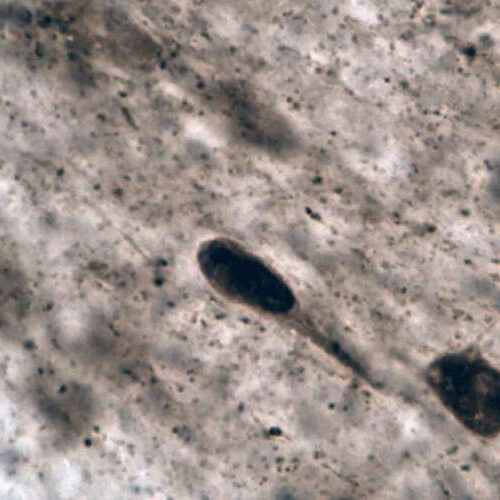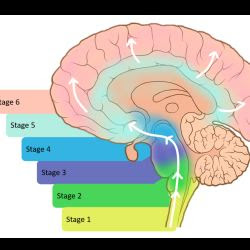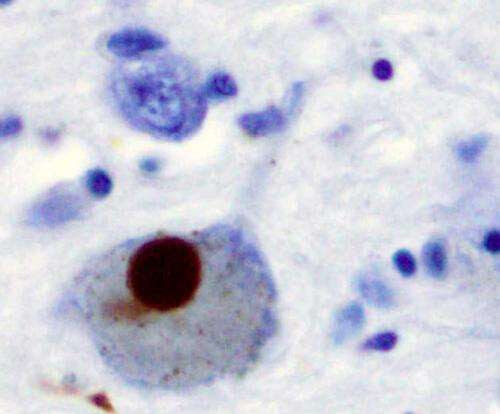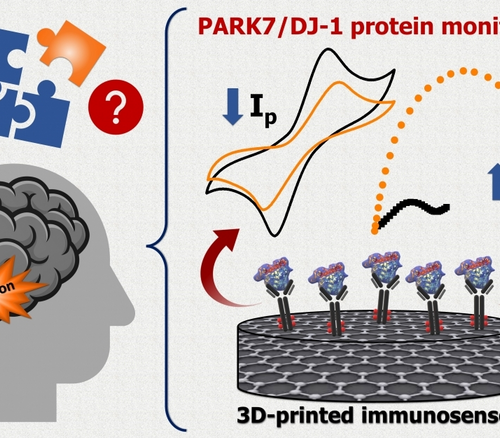Megan Brooks May 12, 2023 A common gut bacteria may play a role in the development of Parkinson’s disease (PD) by causing aggregation of the alpha-synuclein protein, a key feature in the pathology of PD, a small study suggests. Environmental factors as well as genetics are also suspected to play a role in PD etiology, although the exact cause...
Tag: <span>Parkinson’s disease</span>
Can exercise lower the risk of developing Parkinson’s disease?
by American Academy of Neurology Credit: Unsplash/CC0 Public Domain Getting regular exercise such as cycling, walking, gardening, cleaning and participating in sports may decrease the risk of developing Parkinson’s disease, according to new research published in the May 17, 2023, online issue of Neurology. The study found female participants who exercised the most had a 25% lower...
Researchers discover a potential cause of Parkinson’s disease
by University of Helsinki Aggregation of alpha-synuclein in a nerve cell. Credit: Timo Myöhänen research group There are currently 8 million patients with Parkinson’s disease in the world. In 2021, Professor Per Saris’s group published results demonstrating that bacteria of the Desulfovibrio bacterial genus correlate with Parkinson’s disease, and that their higher number also correlates with the severity of the...
New insight into dying cells in Parkinson’s disease
UNIVERSITY OF SOUTHERN DENMARK When a patient experiences the first symptoms of Parkinson’s disease, the disease has been developing for a long time, and the patient may have already lost half of a specific type of nerve cells in the brain. Therefore, researchers are focused on understanding what happens to these brain cells before they become damaged...
A Breakthrough In Parkinson’s Disease
By Chuck Dinerstein, MD, MBA — April 18, 2023 “Our findings suggest that the αSyn-SAA technique is highly accurate at detecting the biomarker for Parkinson’s disease regardless of the clinical features,” says Luis Concha, Ph.D., “making it possible to accurately diagnose the disease in patients at early stages.” For those in the Parkinson’s Disease community, this is...
New study challenges the idea that early Parkinson’s disease causes cognitive dysfunction
by Medical University of South Carolina Credit: Pixabay/CC0 Public Domain Like many neurodegenerative diseases, Parkinson’s disease (PD) is a thief that hacks into human operating systems and corrupts their cognitive hard drives until they can no longer control their movements or perform activities of daily living. Often, in its later stages, Parkinson’s disease steals data too,...
Identifying ‘hallmark’ Parkinson’s disease protein buildup could aid early detection, improved diagnosis and treatment
by Lancet Immunohistochemistry for alpha-synuclein showing positive staining (brown) of an intraneural Lewy-body in the Substantia nigra in Parkinson’s disease. Credit: Wikipedia A technique that identifies the build-up of abnormal protein deposits linked to Parkinson’s disease could aid in early detection and play a key role in the disease’s clinical diagnosis and characterization, according to research published in The...
Low-cost sensor detects early-stage Parkinson’s disease in biological samples
FUNDAÇÃO DE AMPARO À PESQUISA DO ESTADO DE SÃO PAULO IMAGE: THE DEVICE, PRODUCED BY ORDINARY 3D PRINTING AND CAPABLE OF BEING MINIATURIZED, DETECTS LEVELS OF THE PROTEIN PARK7/DJ-1, WHICH IS ASSOCIATED WITH PARKINSON’S DISEASE CREDIT: CRISTIANE KALINKE AND PAULO ROBERTO DE OLIVEIRA Researchers at the University of Campinas (UNICAMP) and the Federal University of São...
Personalized recipe of hopamine can empower patients with Parkinson’s disease
Reviewed by Emily Henderson, B.Sc. Mar 23 2023 When Marina Noordegraaf was diagnosed with Parkinson’s disease at age 49, she noticed when it came to treatment decisions, she sometimes felt powerless. She observed that she herself played an active role in communicating her hopes and wishes to her healthcare professionals, which were not automatically taken...
Scientists shed new light on two proteins that exacerbate the progression of Parkinson’s disease
by Delthia Ricks , Medical Xpress Model. Left: When synaptotagmin-11 (Syt11) is not palmitoylated, alpha-synuclein (αS) is less membrane bound and present in physiologic tetrameric form. Right: Palmitoylated Syt11 alters the local membrane environment, resulting in more membrane-bound αS and decreased physiologic tetramers. Credit: Created with Biorender.com Two proteins may be intimately linked to the...







